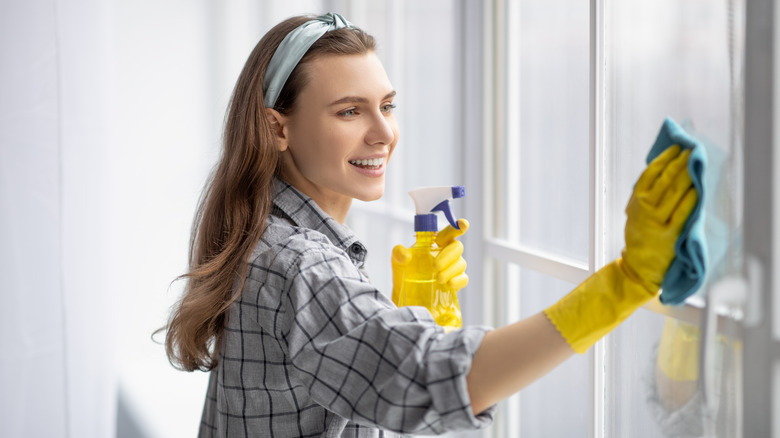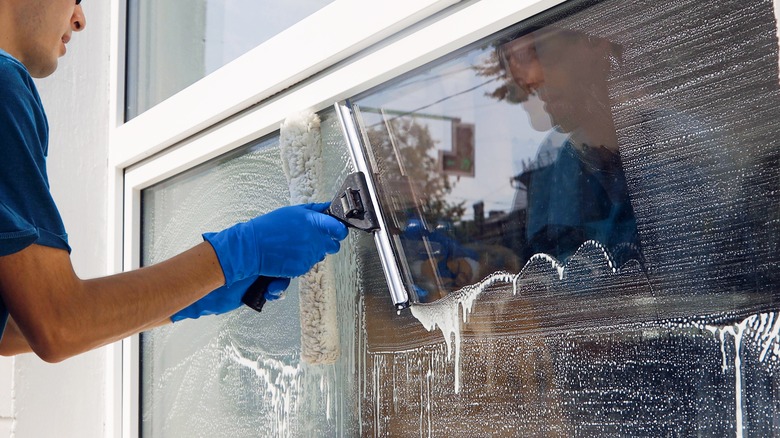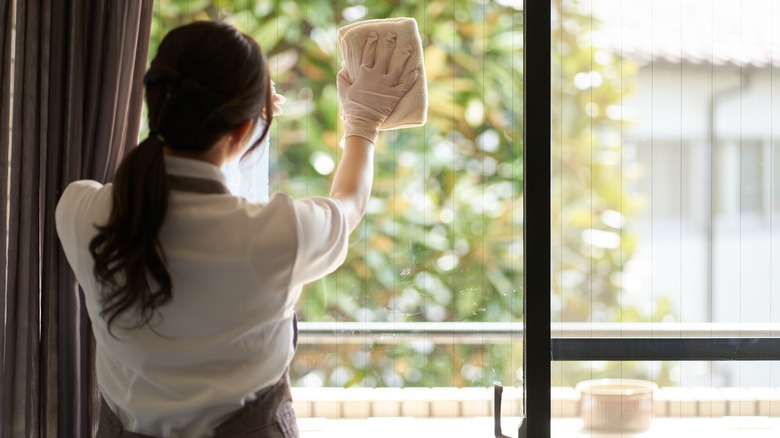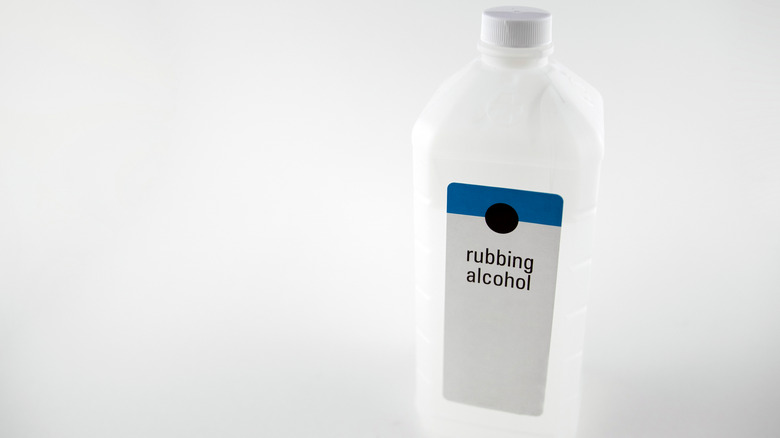How To Clean Windows Without Streaks, According To An Expert
Most surfaces in your home are relatively easy to clean, however, windows are an entirely different ball game. It's crucial to clean both sides, and while cleaning the interior of your windows may seem simple enough, tackling the exterior can pose a lot of challenges.
In an exclusive interview with House Digest, Arman Khalili, founder of Houston-based TruShine Window Cleaning, shared his tips for a streak-free final product. "Window cleaning can be tricky. There's nothing worse than putting in all the effort only to find streaks and smudges still on the windows," says Khalili. Regularly cleaning your windows will to only improve your home's curb appeal and allow the sunlight in, but properly cleaned windows will also ensure that your home is heating efficiently and that your air quality doesn't suffer.
"Following these steps should make sure that your windows stay squeaky clean without any streaks or smudges for longer," he promises. "For best results always use high-quality tools — never underestimate their importance when it comes to having spotless windows all year round." By following his expert recommendations, you can avoid the commonly-made mistakes that can diminish the quality of your cleaning job.
Use the right tools for the job
You likely have an arsenal of cleaning products you prefer to use in your home, from your favorite all-purpose cleaner to your solution for particularly tricky stains or issues. However, windows are unique in that they require tools and products that are both glass-friendly and that don't leave behind unsightly residues.
First of all, Khalili explains that you need to "start by selecting the right cleaning solutions and materials." What works for other surfaces in your home may not be the best choice for your windows. "Avoid harsh chemicals or abrasives such as ammonia and vinegar, as these will damage your window frames or seals over time. Instead, opt for mild soaps or eco-friendly cleaners that are designed specifically for use on glass surfaces," he recommends.
This doesn't have to mean breaking the bank, either — there are plenty of homemade window cleaning solutions that require simple, non-toxic ingredients you may already have at home. Moreover, the tool you use is just as important for a flawless finish. Common choices, such as paper towels or old rags can leave behind residue and streaks. Instead, Khalili explains "you'll also need a good quality squeegee, which is an essential tool for streak-free window cleaning."
Proper execution is key
The technique also plays a huge part. Luckily, Khalili lays out a few rules of thumb. "First mix your chosen soap with warm water in a spray bottle and spray the solution onto the glass surface. Use a soft microfiber cloth to gently wipe down the glass and remove any dirt or debris; then use a squeegee to remove excess moisture from the surface in one swift motion," he outlines. The two-step wipe is where many people go wrong — just using the cloth won't leave you with a streak-free finish, but only using the squeegee won't effectively remove all the grime on your windows. You really do need both.
Additionally, while you may be able to start from anywhere when cleaning other surfaces in your home, for windows you'll want to follow a pattern. "Start at the top of each window pane and make sure you wipe away any remaining soapy residue after each stroke with a dry cloth," recommends Khalili. If you start at the bottom, you're liable to get residue dripping from the top as you work your way up, whereas taking a top-down approach will eliminate that issue.
Tips for stubborn stains
Occasionally, you'll be faced with stains that require more effort to get rid of. Luckily, all you need to do in those situations is switch up the products you're using. "If you have some stubborn stains on your windows, you may need to use something stronger such as rubbing alcohol combined with water in equal parts in another spray bottle," Khalili advises. "Spray this mixture onto stained areas and then scrub them off with a damp cloth until they are removed. Finally, rinse off any remaining traces of soap or rubbing alcohol by once again spraying warm water onto the surfaces and wiping them down with a dry microfiber cloth."
While you never want to use anything abrasive that could potentially scratch the windows' surface, a stronger solution such as rubbing alcohol will help you effectively remove stains without requiring too much elbow grease. And, don't be afraid to spot clean. Even if you're not planning on cleaning all your windows anytime soon, spot-cleaning a problematic stain will allow you to clean the window as normal during your next regularly-scheduled window cleaning session.
Don't forget preventative measures
There's definitely something satisfying about being greeted by sparkling windows throughout your home. However, it is a relatively time-consuming task and not something you want to be doing on a weekly basis. "Once your windows are gleaming it's important to prevent them from getting dirty again too quickly by keeping dust and dirt away from them as much as possible," explains Khalili.
One preventative measure he recommends is to be mindful of your window coverings when you're not home. "Closing curtains when you leave the house can help keep out dust particles that may settle onto glass surfaces outside of your control," Khalili says. If you have blinds or another type of window covering, the same approach applies.
And, since the exterior of your windows is typically exposed to far more dirt and grime than the interior, you can prolong their sparkling finish by using a few helpful products. "Consider applying rain repellent products like Rain-X to balance out limescale buildup that occurs due to hard water exposure over time, helping it run off more easily for quicker cleanups later on," he suggests. It may add some time to an already lengthy process, but you'll be thankful when the next round of cleaning is much easier.




